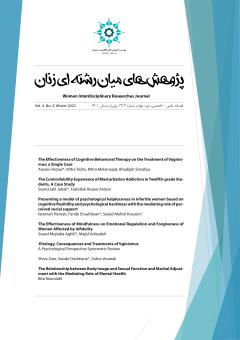-
-
List of Articles
-
Open Access Article
1 - The effectiveness of cognitive behavioral therapy in the treatment of vaginismus: A single-case trial
Arezoo Rezaei Mitra Tadayon Mitra Molaeinezhad Khadijeh Shiralinia -
Open Access Article
2 - The Experience of Controllability of Masturbation Addiction in a Twelfth Grade Student, a Case Study
Seyed Jalil Jebeli fazlollah Rezai Ardani -
Open Access Article
3 - Presenting a model of psychological helplessness in infertile women based on cognitive flexibility and psychological hardiness with the mediating role of perceived social support
Fatemeh Hemmati فریده انصافداران Seyed Mehdi Hosseini -
Open Access Article
4 - The Effectiveness of Mindfulness on Emotional Regulation and Forgiveness of Women Affected by Infidelity
Mojtaba Aghili majid valizadeh -
Open Access Article
5 - Etiology, Consequences and Treatments of Vginismus: A Psychological Perspective Systematic Review
shiva zare soode dashtiane Zahra Shomali -
Open Access Article
6 - The Relationship Between Body Image and Sexual Function and Marital Adjustment with the Mediating Role of Mental Health
Bita Nasr Alahi samira ghadimi
-
The rights to this website are owned by the Raimag Press Management System.
Copyright © 2017-2025







